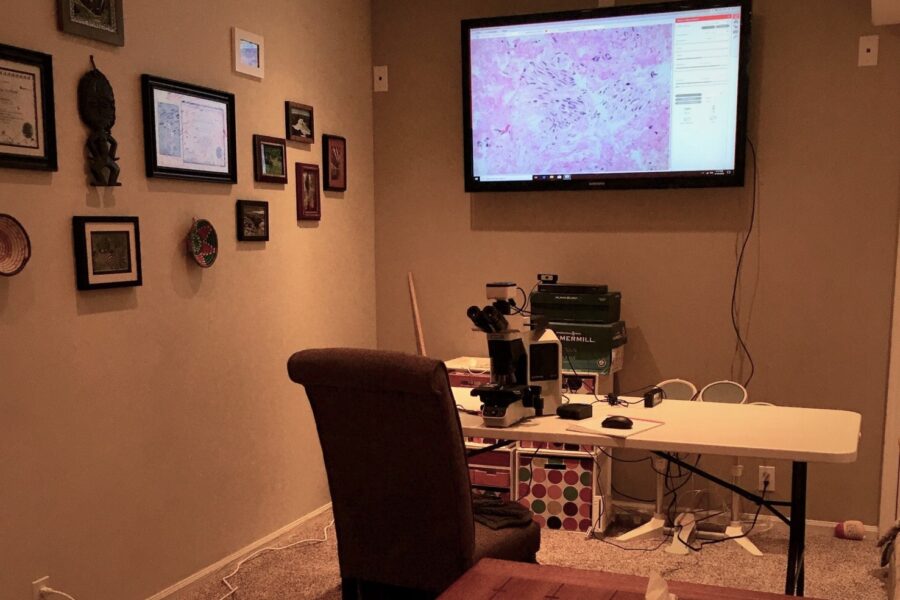When learning abruptly moved off campus, thanks to the ongoing COVID-19 pandemic, College of Allied Health Professions (CAHP) educators and students had to adapt — and quickly. Dean Kyle Meyer, Ph.D., said he was amazed, but not surprised, at the innovation our faculty demonstrated to continue to deliver high quality education for our students.
Amber Donnelly, Ph.D., professor and director of the UNMC Cytotechnology Program, is teaching virtual microscopy from home. Cytotechnology had a head start on its COVID-19 planning, as Dr. Donnelly and collaborator Manju Mukherjee, Ph.D., already conduct the nation’s only virtual microscopy program, teaching students remotely across the U.S.
They use zoom to connect to their students and discuss the cytology cases, which is exactly what they do from the classroom since they have students at multiple sites across the U.S.
“It just gives us the option to be more interactive with the students, since more of what they are using virtual microscopy, mScope, for is on their own,” said Dr. Donnelly.
At the UNMC physical therapy education program, “We are handling this transition well thanks to a pre-established culture of collaboration, which was established far before COVID-19,” said Sara Bills, D.P.T., who with Kellie Gossman, D.P.T., moved rapidly to transition curriculum to remote education. “Individuals like Dr. Pat Hageman and Dr. Joe Norman, both former program directors and still on faculty, have shown us how to leverage team members’ strengths and build cohesion. Our current director, Dr. Betsy Becker, has been a rock.”
While planning, Drs. Gossman and Bills decided to have daily drop-in innovation sessions during which faculty brainstormed and shared ideas for effective remote education.
For the UNMC Medical Nutrition Program, classes were restructured and new collaborations formed. Their Capstone was reformatted to combine direct instruction through Capstone “Bootcamps,” with peer discussion through Zoom Breakout rooms and Canvas discussion boards.
Instructor Mariah Dougherty said that Capstone Bootcamps provide resources to build understanding of specific components of a research capstone as well as checkpoints to guide student progress. Students will also participate in peer review sessions via Canvas discussion boards and Zoom Breakout rooms to critically assess and provide active feedback on their capstone papers, which helps students grow in their own writing skills, critical thinking, and communication.
A brand new course, Integrative Nutrition and Applied Genetics and Pharmacology, includes new collaboration between medical nutrition and genetic counseling students to complete interprofessional case studies. Originally to be taught in-person in the fall, due to COVID-19 it was restructured to be all online using discussion boards, Zoom Breakout rooms, and simulated clinical role-play experiences via Zoom.
In addition, medical nutrition has partnered with the UNL dietetic internship program to enroll the UNL students in the new course, providing additional learning experiences to help UNL nutrition students meet graduation criteria by Summer 2020. UNMC and UNL nutrition students will complete projects together, fostering professional development and collaboration.
Corri Hanson, Ph.D., associate professor and director of the UNMC Medical Nutrition Program, said, “I am so impressed and proud of our faculty’s rapid and enthusiastic response to the transition to online learning, and also with the resilience of our students. While these are challenging times, they have certainly risen to the occasion and the new things we have learned will benefit us going forward.”
While some of our programs have always had an online component, completely remote education presented a new challenge for many. Our faculty have met the challenge, however, and continue to offer excellent health care education in innovative ways.
